Alliance of Mohammed Rafi with legendary filmmaker Bimal Roy
A personal compliment to Bimal Roy Sahab on his 115 birth anniversary by Biman Baruah
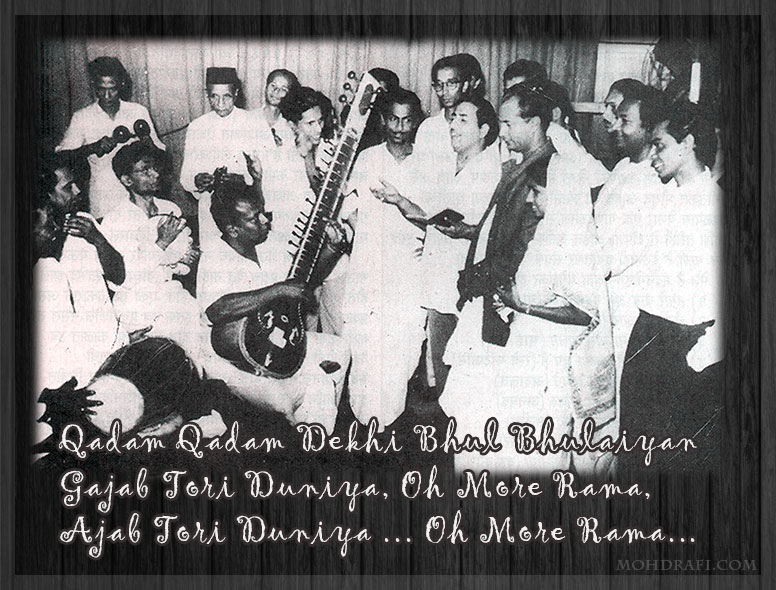
Legendary filmmaker Bimal Roy’s films were paramount branded for pragmatic value of socialism and romanticism with poignant music. His films confined some attractive and unforgettable songs of golden era of Hindi Cinema which were harmonic by all leading playback singers of his time. The music of his films mainly composed by Salil Chowdhury and Sachin Dev Burman. Mohammed Rafi Sahab sung in his films like DO BIGHA ZAMEEN (1953), BIRAJ BAHU (1954), DEVDAS (1955), MADHUMATI (1958), YAHUDI (1958), SUJATA (1959) USNE KAHA THA (1960), KABULIWALA (1961), BENAZIR (1964) etc.
Bimal Roy was born on 12 July, 1909 into a landowner family in Suapur in East Bengal, now in Bangladesh. At the young age, he lost his father when he was a student in Jagannath College of Dhaka. He moved to Calcutta with his widowed mother and infant brothers. From childhood had a gusto for photography which paid off, so his struggle period in Calcutta did not last very long. Actor-Director, Pramathesh Chandra Baruah hails from Guaripur, Dhuburi, Assam appointed him as a still photographer for publicity of his films. After recognising his frame and overwhelmed by his keenness, Baruah took more risk by making young Bimal Roy an independent cinematographer in New Theatres Pvt. Ltd. Later on Roy also assisted director P.C. Baruah during making of bengali DEVDAS (1935) starring Baruah himself and Hindi DEVDAS (1936) starring K.L. Saigal. All films of director P. C. Baruah (Manzil, Mukti, Adhikar, Rajat Jayanti, Zindagi at New Theatres were cinematographed by Bimal Roy. Baruah left New Theatres in 1939 and Roy made his first documentary film BENGAL FAMINE in 1943. He debuted as director with bengali film UDAYER PATHEY (1944) which was also made in Hindi as HAMRAHI (1944) produced by New Theatres. Till 1949, Roy directed several films at New Theatres and in the meantime there was a decline in Calcutta based film Industry. In 1950, Roy shifted to Bombay along with his team of editor Hrishikesh Mukherjee, screenplay writer Nabendu Ghosh, cinematographer Kamal Bose, assistant director Asit Sen and later music director Salil Chaudhury.
In Bombay, Roy became affable with Actor-Producer Ashok Kumar and on his verdict Roy directed MAA (1952) for Bombay Talkies. Then there was a downhill curve for Bombay Talkies, Ashok Kumar requested Roy to direct his own production PARINEETA (1953) starring himself and Meena Kumari based on a story of Sarat Chandra Chatterjee. In the mean time, Roy was inspired by Italian neo-realist cinema and he determined to make a real sensitive film with social root. After receiving resistance from friends, he take a challenge of film production and started his own production company, BIMAL ROY PRODUCTIONS with DO BIGHA ZAMEEN (1953). Though he started his own production house from Do Bigha Zameen (1953), he continued directing outside films like BIRAJ BAHU (1954), BAAP BETI (1954) and YAHUDI (1958).
A brief description of Bimal Roy Films, where our beloved Rafi Sahab sung:
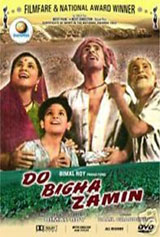 1. DO BIGHA ZAMIN (1953): It was the first film produced by Bimal Roy starring Balraj Sahani and Nirupa Roy in lead role which was based on a story named “Rickshawala” penned by Salil Choudhary. The film got the title from a famous bengali poem, “Dui Bigha Jomi” by Vishwakabi Rabindranath Tagore and it was inspired by the Italian film Bicycle Thieves (1948). The film was based on a social theme that how real farmers were suffered from rapid industrialisation after independence and became an vital film of Indian parallel cinema. Though the film got judicious commercial success, music of the film penned by Salil Choudhary became very popular. Out of the four songs from the film, “Ajab Tori Duniya Ho Mere Rama” sung by Rafi Sahab with chorus was bacame a song of every common man. The other solo, “Aaja Ri Aa Nindiya Tu Aa” sung by Lata Mangeshkar and two duets “Dharti Kahe Pukaar Ke” & “Hariyaala Saawan Dhol Bajaata Aaya” sung by Manna Dey, Lata Mangeshkar & Chorus.
1. DO BIGHA ZAMIN (1953): It was the first film produced by Bimal Roy starring Balraj Sahani and Nirupa Roy in lead role which was based on a story named “Rickshawala” penned by Salil Choudhary. The film got the title from a famous bengali poem, “Dui Bigha Jomi” by Vishwakabi Rabindranath Tagore and it was inspired by the Italian film Bicycle Thieves (1948). The film was based on a social theme that how real farmers were suffered from rapid industrialisation after independence and became an vital film of Indian parallel cinema. Though the film got judicious commercial success, music of the film penned by Salil Choudhary became very popular. Out of the four songs from the film, “Ajab Tori Duniya Ho Mere Rama” sung by Rafi Sahab with chorus was bacame a song of every common man. The other solo, “Aaja Ri Aa Nindiya Tu Aa” sung by Lata Mangeshkar and two duets “Dharti Kahe Pukaar Ke” & “Hariyaala Saawan Dhol Bajaata Aaya” sung by Manna Dey, Lata Mangeshkar & Chorus.
It was the first film to win the Filmfare Best Movie & Best Director Award in 1954 and the first Indian film to win the International Prize at Cannes Film Festival after NEECHA NAGAR (1946) by Chetan Anand. Bimal Roy Sahab also distributed the film abroad with the title “Calcutta – The Cruel City”.
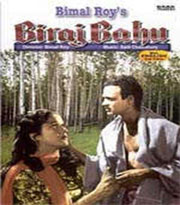 2. BIRAJ BAHU (1954): It was a social drama of childless couple played by Kamini Kaushal and Abhi Bhattacharya whose poor economic condition’s undue benefit taken by rich man played by Pran. The story was based on Bengali novel penned by Sarat Chandra Chatterjee, produced by Hiten Choudhury and directed by Bimal Roy. This Salil Choudhury musical’s songs were sung by Hemant Kumar, Mohd. Rafi, Lata Mangeshkar and Shyamal Mitra. Rafi Sahab’s devotional number, “Suno Seeta Ki Kahani Ke Woh Mehaloon Ki Rani, Chod Ghar Baar Gayee Banbaas Kisi Ne Kadar Na Jani” gesticulate the theme and climax of the film. The film was nominated for Cannes Film Festival and won National Award for Best Feature Film. It also won the Filmfare Best Director for Bimal Roy and Best Actress for Kamini Kaushal.
2. BIRAJ BAHU (1954): It was a social drama of childless couple played by Kamini Kaushal and Abhi Bhattacharya whose poor economic condition’s undue benefit taken by rich man played by Pran. The story was based on Bengali novel penned by Sarat Chandra Chatterjee, produced by Hiten Choudhury and directed by Bimal Roy. This Salil Choudhury musical’s songs were sung by Hemant Kumar, Mohd. Rafi, Lata Mangeshkar and Shyamal Mitra. Rafi Sahab’s devotional number, “Suno Seeta Ki Kahani Ke Woh Mehaloon Ki Rani, Chod Ghar Baar Gayee Banbaas Kisi Ne Kadar Na Jani” gesticulate the theme and climax of the film. The film was nominated for Cannes Film Festival and won National Award for Best Feature Film. It also won the Filmfare Best Director for Bimal Roy and Best Actress for Kamini Kaushal.
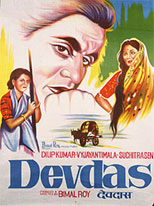 3. DEVDAS (1955): It was third film directed by Bimal Roy Sahab based on a novel penned by Sarat Chandra Chatterjee. The film was Hindi debut of Suchitra Sen with high level star cast of Dilip Kumar, Vyjayanthimala, Motilal, Nazir Hussain, Murad, Pratima Devi, Iftekhar, Jhoney Walker and Pran. The music of the film composed by S.D. Burman, lyrics written by Sahir Ludhianvi for nine songs sung by Mubarak Begum, Geeta Dutt, Lata Mangeshkar, Talat Mehmood, Manna Dey and Mohammed Rafi. Rafi Sahab sung “Raahi O Raahi Manzil Ki Chah Mein” with Chorus the most emotional song of the film. The song was played in the background when Suchitra Sen and Vyjayanthimala passing each other in the village lane.The film was best known for Dilip Kumar’s facial expression of depression, film’s cinematography and lighting by Kamal Bose.
3. DEVDAS (1955): It was third film directed by Bimal Roy Sahab based on a novel penned by Sarat Chandra Chatterjee. The film was Hindi debut of Suchitra Sen with high level star cast of Dilip Kumar, Vyjayanthimala, Motilal, Nazir Hussain, Murad, Pratima Devi, Iftekhar, Jhoney Walker and Pran. The music of the film composed by S.D. Burman, lyrics written by Sahir Ludhianvi for nine songs sung by Mubarak Begum, Geeta Dutt, Lata Mangeshkar, Talat Mehmood, Manna Dey and Mohammed Rafi. Rafi Sahab sung “Raahi O Raahi Manzil Ki Chah Mein” with Chorus the most emotional song of the film. The song was played in the background when Suchitra Sen and Vyjayanthimala passing each other in the village lane.The film was best known for Dilip Kumar’s facial expression of depression, film’s cinematography and lighting by Kamal Bose.

Bimal Roy Sahab’s adaptation of Devdas in celluloid is one of the best out of several Devdas portrayed on screen and Indiatimes Movies ranked the film amongst the “Top 25 Must See Hindi Films” in even 2005. The film won the 3rd National Award in 1955 for Best Feature Film in Hindi. It also won the 4th Filmfare Award for Best Actor to Dilip Kumar, Best Supporting Actor to Motillal and Best Supporting Actress to Vyjayanthimala. But Vyjayanthimala refused to accept the award claiming that her role was not a supporting one in the film.
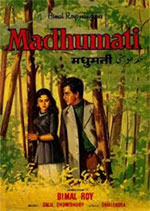 4.MADHUMATI (1958): It was the most flourishing and high-ranking film produced and directed by Bimal Roy Sahab. It was earliest film based on re-embodiment innovatively written by Ritwik Ghatak and Rajinder Singh Bedi starring Dilip Kumar, Vyjayanthimala, Jayant, Johnny Walker, Tarun Bose and Pran. The film was memorable for two characters played by Vyjayanthimala and Pran. Vyjayanthimala was playing double role of “Madhumati” as a tribal girl and “Radha” as a wife of Dilip Kumar in two different lifes. Pran Sahab played the role of “Ugranarayan”, a rich Timber Estate owner who is very cruel, egotistic and un-human in nature. It was also a musical hit with one dozen songs composed by Salil Choudhury in the lyrics of Shailendra. The songs were sung by Mohammed Rafi, Ghulam Mohammad, Manna Dey, Mukesh, Dwijen Mukherjee, Mubarak Begum, Lata Mangeshkar, Asha Bhonsle and Sabita Chowdhury. As a most versatile singer of generation, Rafi Sahab sung two different songs in the film for two different actor. The tragic number, “Toote Huye Khwabon Ne Humko Ye Shikhaaya Hai Dil Ne Jise Paayaa Thaa Aakhon Ne Gawaayan Hain” fortragedy kingDilip Kumar and the comic number, “Jungle Mein Mor Naacha Kisi Ne Na Dekha, Humne Thodi Si Peke Jhooma Sabne Dekha” for comedy king Jhonny Walker.
4.MADHUMATI (1958): It was the most flourishing and high-ranking film produced and directed by Bimal Roy Sahab. It was earliest film based on re-embodiment innovatively written by Ritwik Ghatak and Rajinder Singh Bedi starring Dilip Kumar, Vyjayanthimala, Jayant, Johnny Walker, Tarun Bose and Pran. The film was memorable for two characters played by Vyjayanthimala and Pran. Vyjayanthimala was playing double role of “Madhumati” as a tribal girl and “Radha” as a wife of Dilip Kumar in two different lifes. Pran Sahab played the role of “Ugranarayan”, a rich Timber Estate owner who is very cruel, egotistic and un-human in nature. It was also a musical hit with one dozen songs composed by Salil Choudhury in the lyrics of Shailendra. The songs were sung by Mohammed Rafi, Ghulam Mohammad, Manna Dey, Mukesh, Dwijen Mukherjee, Mubarak Begum, Lata Mangeshkar, Asha Bhonsle and Sabita Chowdhury. As a most versatile singer of generation, Rafi Sahab sung two different songs in the film for two different actor. The tragic number, “Toote Huye Khwabon Ne Humko Ye Shikhaaya Hai Dil Ne Jise Paayaa Thaa Aakhon Ne Gawaayan Hain” fortragedy kingDilip Kumar and the comic number, “Jungle Mein Mor Naacha Kisi Ne Na Dekha, Humne Thodi Si Peke Jhooma Sabne Dekha” for comedy king Jhonny Walker.
Bimal Roy Sahab got the National Award for Madhumati as Best Feature Film in Hindi. It also succeed nine Filmfare Awards for Best Director (Bimal Roy), Best Actor (Dilip Kumar), Best Supporting Actor (Jhonny Walker), Best Music Director (Salil Choudhury), Best Female Playback Singer (Lata Mangeshkar), Best Dialogue (Rajender Singh Bedi), Best Art Direction (Sudhendu Roy), Best Cinematography (Dilip Gupta) and Best Editing (Hrishikesh Mukherjee) which was a record for almost three decades. The film was inspiration for many films on the topic of reincarnation in Indian as well as in world cinema.
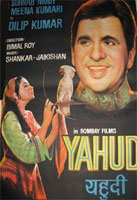 5. YAHUDI (1958): By means of title, story of the film set in the era of Roman Empire more than 2000 years ago at the time of maltreatment to Jews in Rome. The film was produced by Savak B. Vacha and directed by Bimal Roy starring Sohrab Modi, Dilip Kumar, Meena Kumari, Nazir Hussain, Nigar Sultana, Helen, Murad and Anwar Hussain. It was a Shanker-Jaikishan musical with seven songs sung by Mohammed Rafi, Mukesh, Lata Mangeshkar and Geeta Dutt. The film start with high pitch Mohammed Rafi song,“Ye Duniya Hay Hamari Ye Duniya, Shaitanoon Ki Basti Hai Yeha Zindegi Sasti Hai” showingin the surroundings about punishment by Roman Empire gaurds to Jews. In this film, Shailendra Sahab won the Best lyricist Award for the song, “Yeh Mera Diwanapan Hai Ya Mohabbat Ka Surror, Tu Na Pehchane Tu Hai Yeh Teri Nazaron Ka Qusur” sung by Mukesh Sahab.
5. YAHUDI (1958): By means of title, story of the film set in the era of Roman Empire more than 2000 years ago at the time of maltreatment to Jews in Rome. The film was produced by Savak B. Vacha and directed by Bimal Roy starring Sohrab Modi, Dilip Kumar, Meena Kumari, Nazir Hussain, Nigar Sultana, Helen, Murad and Anwar Hussain. It was a Shanker-Jaikishan musical with seven songs sung by Mohammed Rafi, Mukesh, Lata Mangeshkar and Geeta Dutt. The film start with high pitch Mohammed Rafi song,“Ye Duniya Hay Hamari Ye Duniya, Shaitanoon Ki Basti Hai Yeha Zindegi Sasti Hai” showingin the surroundings about punishment by Roman Empire gaurds to Jews. In this film, Shailendra Sahab won the Best lyricist Award for the song, “Yeh Mera Diwanapan Hai Ya Mohabbat Ka Surror, Tu Na Pehchane Tu Hai Yeh Teri Nazaron Ka Qusur” sung by Mukesh Sahab.
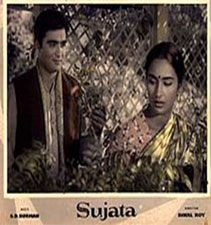 6. SUJATA (1959): The film is about Dr. B.R. Ambedkar’s fight against untouchbility in India based on a Bengali short story penned by Subodh Ghosh. The film was produced and directed by Bimal Roy exploring the state of castisim in India starring Sunil Dutt, Nutan, Shashikala, Lalita Pawar, Tarun Bose, Asit Sen. It was a dashing love story between a Brahmin simple young man Adheer played by Sunil Dutt and an untouchable woman Sujata played by Nutan. Film’s music was composed by S.D. Burman, seven popular songs were written by Majrooh Sultanpuri and sung by Geeta Dutt, Asha Bhosle, S.D. Burman, Talat Mehmood and Mohammed Rafi. Rafi Sahab sung the theme song, “Andhe Ne Bhi Sapne Dekha Kya Hai Zamaana……… Waah Bhai Waah” which was played at theclimax of the film. The film was nominated for International Cannes Film Festival in 1960. It also won National Award for Third Best Feature Film and four Filmfare Awards for Best Film, Best Director, Best Actress, Best Story.
6. SUJATA (1959): The film is about Dr. B.R. Ambedkar’s fight against untouchbility in India based on a Bengali short story penned by Subodh Ghosh. The film was produced and directed by Bimal Roy exploring the state of castisim in India starring Sunil Dutt, Nutan, Shashikala, Lalita Pawar, Tarun Bose, Asit Sen. It was a dashing love story between a Brahmin simple young man Adheer played by Sunil Dutt and an untouchable woman Sujata played by Nutan. Film’s music was composed by S.D. Burman, seven popular songs were written by Majrooh Sultanpuri and sung by Geeta Dutt, Asha Bhosle, S.D. Burman, Talat Mehmood and Mohammed Rafi. Rafi Sahab sung the theme song, “Andhe Ne Bhi Sapne Dekha Kya Hai Zamaana……… Waah Bhai Waah” which was played at theclimax of the film. The film was nominated for International Cannes Film Festival in 1960. It also won National Award for Third Best Feature Film and four Filmfare Awards for Best Film, Best Director, Best Actress, Best Story.
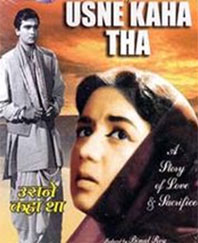 7. USENE KAHA THA (1960): Thefilm was based on a well-known Hindi short story of same name penned by Chandradhar Sharma Guleri. It was produced by Bimal Roy which was debut of director Moni Bhattacharjee and actress Indrani Mukherjee. Film starring Sunil Dutt, Nanda, Rajendra Nath, Durga Khote, Tarun Bose, Asit Sen, Leela Mishra which music was composed by Salil Choudhury and lyrics written by Shailendra. It had five different songs sung by Talat Mehmood, Lata Mangeshkar, Manna Dey, Sabita Choudhury and Mohammed Rafi. Rafi Sahab sung two assorted duets in the film. The male duet, “Chalte Hi Jana Ho, Jaha Tak Yeh Raah Chale” sung by Rafi-Manna Dey for Sunil Dutt and Rajendra Nath set in a bullock cart competition. The romantic duet, “Balkhaati Sharmati Aa Ja” sung by Rafi and Sabita Choudhury for Sunil Dutt and Nanda which was set in a exotic outdoor gathering.
7. USENE KAHA THA (1960): Thefilm was based on a well-known Hindi short story of same name penned by Chandradhar Sharma Guleri. It was produced by Bimal Roy which was debut of director Moni Bhattacharjee and actress Indrani Mukherjee. Film starring Sunil Dutt, Nanda, Rajendra Nath, Durga Khote, Tarun Bose, Asit Sen, Leela Mishra which music was composed by Salil Choudhury and lyrics written by Shailendra. It had five different songs sung by Talat Mehmood, Lata Mangeshkar, Manna Dey, Sabita Choudhury and Mohammed Rafi. Rafi Sahab sung two assorted duets in the film. The male duet, “Chalte Hi Jana Ho, Jaha Tak Yeh Raah Chale” sung by Rafi-Manna Dey for Sunil Dutt and Rajendra Nath set in a bullock cart competition. The romantic duet, “Balkhaati Sharmati Aa Ja” sung by Rafi and Sabita Choudhury for Sunil Dutt and Nanda which was set in a exotic outdoor gathering.
Though the film did not do well in the box office, it will be memorable for rebel hero Sunil Dutt was playing a role of simple Army Officer, Nandu. At the end of the film, Nandu sacrified his life in the war for saving his superier who is husband of his ex-lover Kamli played by Nanda and breathe his last saying “Usne Kaha Tha”.
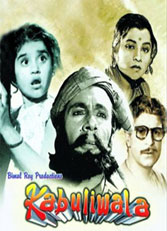 8. KABULIWALA (1961): It was the most affluent version of Rabindranath Tagore’s story of same name outsie Bengal produced by Bimal Roy and directed by Hemen Gupta who was private secretary to Subhas Chandra Bose went on to direct several films like Taksaal (1956) and Netaji Subhas Chandra Bose (1966). It was a simple story of natural love and affection between an Afgani migrant dry-fruit seller in Calcutta played by Balraj Sahni and a young Bengali girl Mini played by Baby Farida whom he visualizes as his child in remembrance of his daughter Amina left in Kabul. Film’s four songs composed by Salil Choudhury in the lyrics of Prem Dhawan and Gulzar. The songs were sung by Hemant Kumar, Usha Mangeshkar, Manna Dey and Mohammed Rafi. Rafi Sahab sung the Afgani essence song, “O Ya Qurbaan” for Balraj Sahani who played the title role.
8. KABULIWALA (1961): It was the most affluent version of Rabindranath Tagore’s story of same name outsie Bengal produced by Bimal Roy and directed by Hemen Gupta who was private secretary to Subhas Chandra Bose went on to direct several films like Taksaal (1956) and Netaji Subhas Chandra Bose (1966). It was a simple story of natural love and affection between an Afgani migrant dry-fruit seller in Calcutta played by Balraj Sahni and a young Bengali girl Mini played by Baby Farida whom he visualizes as his child in remembrance of his daughter Amina left in Kabul. Film’s four songs composed by Salil Choudhury in the lyrics of Prem Dhawan and Gulzar. The songs were sung by Hemant Kumar, Usha Mangeshkar, Manna Dey and Mohammed Rafi. Rafi Sahab sung the Afgani essence song, “O Ya Qurbaan” for Balraj Sahani who played the title role.
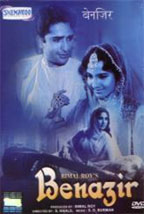 9. BENAZIR (1964): It was a gorgeous Muslim family drama starring Ashok Kumar, Meena Kumari, Shashi Kapoor, Tanuja, Nirupa Roy, Durga Khote, Asit Sen and Tarun Bose. It was produced by Bimal Roy and directed by S. Khalil. The title role of Benazir played by Meena Kumari who is a mistress of Nawab played by Ashok Kumar. The story clutch a twist when young Anwar played by Shashi Kapoor who is going to marry Sahida played by Tanuja started recurrent visit to Benazir to make end the affair of his elder brother. S.D. Burman composed nine songs in the lyrics of Shakeel Badayuni for the film. The songs were sung by Mohammed Rafi, Lata Mangeshkar, Usha Mangeshkar and Asha Bhosle. Rafi Sahab sung a stunning romantic solo, “Dil Mein Ek Jane Tamanna Ne Jagah Paayee Hai” for Shashi Kapoor. He also sung a duet with Lata, “Aa Mere Paas Aa Ke Ji Sahta Hai Tere Gale Lag Jaon” for other artist. Benazir is memorable for commendable musical score by S.D. Burman as well as Shashi Kapoor and Tanuja playing a jovial handsome young pair for first and last time.
9. BENAZIR (1964): It was a gorgeous Muslim family drama starring Ashok Kumar, Meena Kumari, Shashi Kapoor, Tanuja, Nirupa Roy, Durga Khote, Asit Sen and Tarun Bose. It was produced by Bimal Roy and directed by S. Khalil. The title role of Benazir played by Meena Kumari who is a mistress of Nawab played by Ashok Kumar. The story clutch a twist when young Anwar played by Shashi Kapoor who is going to marry Sahida played by Tanuja started recurrent visit to Benazir to make end the affair of his elder brother. S.D. Burman composed nine songs in the lyrics of Shakeel Badayuni for the film. The songs were sung by Mohammed Rafi, Lata Mangeshkar, Usha Mangeshkar and Asha Bhosle. Rafi Sahab sung a stunning romantic solo, “Dil Mein Ek Jane Tamanna Ne Jagah Paayee Hai” for Shashi Kapoor. He also sung a duet with Lata, “Aa Mere Paas Aa Ke Ji Sahta Hai Tere Gale Lag Jaon” for other artist. Benazir is memorable for commendable musical score by S.D. Burman as well as Shashi Kapoor and Tanuja playing a jovial handsome young pair for first and last time.
List of Films Produced by Bimal Roy under his own banner Bimal Roy Productions:
| SL | Year | Name of Film | Director | MusicDirector | Star Cast |
|---|---|---|---|---|---|
| 1 | 1953 | Do Bigha Zameen | Bimal Roy | S. D. Burman | Balraj Sahani, Nirupa Roy, Nazir Hussain, Ratan Kumar, Jagdeep, Murad, Meena Kumari. |
| 2 | 1954 | Naukri | Bimal Roy | Shalil Choudhary | Kishore Kumar Sheila Ramani, Mehmood, Achala Sachdev, Noor, Kanhaiyalal. |
| 3 | 1955 | Devdas | Bimal Roy | S. D. Burman | Dilip Kumar, Suchitra Sen, Motilal, Vyajyantimala, Nazir Hussain, Iftekhar, Jhoney Walker, Pran. |
| 4 | 1955 | Amaanat | Aravind Sen | Shalil Choudhary | Bharat Bhushan, Chand Usmani, Pran, Nazir Hussain, Achala Sachdev, Kanhaiyalal. |
| 5 | 1956 | Parivaar | Asit Sen | Shalil Choudhary | Kishore Kumar, Usha Kiran, Durga Khote, Agha, Mohan Choti, Dhumal. |
| 6 | 1957 | Apradhi Kaun ? | Asit Sen | Shalil Choudhary | Abhi Bhattacharya, Mala Sinha, Dhumal, Murad, Gajanan Jagirdar. |
| 7 | 1958 | Madhumati | Bimal Roy | Shalil Choudhary | Dilip Kumar Vyjyanthimala, Jhoney Walker, Pran. |
| 8 | 1959 | Sujata | Bimal Roy | S.D. Burman | Sunil Dutt, Nutan, Lalita Pawar, Shashikala Tarun Bose, Asit Sen. |
| 9 | 1960 | Parakh | Bimal Roy | Shalil Choudhary | Sadhana, Motilal, Durga Khote, Jayant, Kanhaiyalal,Asit Sen, Keshto. |
| 10 | 1960 | Usne Kaha Tha | Moni Bhattacharjee | Shalil Choudhary | Sunil Dutt, Nanda, Rajendra Nath, Durga Khote, Indrani Mukherjee. |
| 11 | 1961 | Kabuliwala | Heman Gupta | S.D. Burman | Balraj Sahani, Usha Kiran, Sajjan, Sonu. |
| 12 | 1962 | Prem Patra | Bimal Roy | Shalil Choudhary | Shashi Kapoor, Sadhana, Seema Deo, Rajendra Nath, Bela Bose. |
| 13 | 1963 | Bandini | Bimal Roy | S. D. Burman | Ashok Kumar, Nutan Bhel, Tarun Bose, Dharmendra, Iftekhar. |
| 14 | 1964 | Benazir | S. Khalil | S. D. Burman | Ashok Kumar, Meena Kumari,Shashi Kapoor, Tanuja, Nirupa Roy. |
| 15 | 1968 | Do Dooni Char | Debu Sen | Hemant Kumar | Kishore Kumar, Tanuja, Asit Sen, Sudha Rani, Rashid Khan. |
Bimal Roy Sahab also produced two documentary films under his own banner, first is LIFE AND MESSAGE OF SWAMI VEVEKANANDA (1964) directed by himself and second is GAUTAMA THE BUDDHA (1967) directed by Rajbans Khanna.
After Indepandence of India, there were only few filmmakers who introduced Indian Cinema to World Cinema. Within a very short span of time, filmmaker Bimal Roy pioneered among them like V. Shantaram, Mehboob Khan, Raj Kapoor, Guru Dutt, etc. Bimal Roy Sahab’s win over in Indian as well as in world cinema is across-the-board. He was the first Indian filmmaker who mitigated gap between emerging Parallel Cinema and mainstream Commercial Hindi Cinema. His first production DO BIGHA ZAMEEN overlap the art as well as commercial cinema since it was a critical and commercial success. His great commercial success film MADHUMATI conceivably first film based on subject of reincarnation which became inspiration for many future commercial filmmakers. For instance, Subash Ghai’s KARZ (1980), Chetan Anand’s KUDRAT(1981), Rakesh Roshan’s KARAN ARJUN (1995) based on same subject of reincarnation. More recent film, OM SHANTI OM (2007) directed by Farah Khan starring producer Shahrukh Khan directly inspired by Madhumati and they replicated some plots in the film without giving recognition to Bimal Roy. In 1959, Bimal Roy Sahab was a jury member at the 1st Moscow International Film Festival. But he did get right recognition as a filmmaker at his time since his fine art was outshined by showmanship of other filmmakers. Presently, his films are screened at major national and international film festivals of India, Europe and North America.
As a filmmaker, he had given break to new directors in his films like AMAANAT (1955), PARIVAR (1956), APRADHI KAUN ? (1957), USNE KAHA THA (1960), BENAZIR (1964) and new artists like Sadhana (Parakh, Prem Patra), Shashi Kapoor (Prem Patra, Benazir), Dharmendra (Bandini). He also known for approving unconventional roles for Nutan (Sujata, Bandini) and Sunil Dutt (Sujata, Usne Kaha Tha). After his death in 1966, his type of filmmaking continued by his assistant directors like Hrishikesh Mukherjee, Basu Bhattacharjee and Gulzar as a tradition.
An account of 12 popular songs from Bimal Roy films sung by other singers: –
| SL No. | Year | Film | Song | Singer | Music | Lyrics |
|---|---|---|---|---|---|---|
| 1 | 1953 | Parineeta | Chali Radhe Rani Apne Mohan Se Mukhda Mor Ke | Manna Dey | Salil Choudhary | Shailendra |
| 2 | 1953 | Do Bigha Zameen | Dharti Kahe Pukaar Ke | Manna Dey Lata | Salil Choudhary | Shailendra |
| 3 | 1954 | Naukri | Chota Sa Ghar Hoga Badalon Ki Chhaon Mein | Kishore Kumar | Salil Choudhary | Shailendra |
| 4 | 1958 | Madhumati | Suhana Safar Aur Yeh Mausam Haseen | Mukesh | Salil Choudhary | Shailendra |
| 5 | 1958 | Madhumati | Ghadi Ghadi Mora Dil Dhadake | Lata Mangeshkar | Salil Choudhary | Shailendra |
| 6 | 1959 | Sujata | Jalte Hain Jiske Liye Teri Aankhon Ke Diye | Talat Mehmood | S. D. Burman | Majrooh Sultanpuri |
| 7 | 1959 | Sujata | Nanhi Kali Sone Chali Hawa Dheere Aana | Geeta Dutt | S. D. Burman | Majrooh Sultanpuri |
| 8 | 1959 | Sujata | Kaali Ghata Chhaye Mora Jiya Tarsaaye | Asha Bhosle | S. D. Burman | Majrooh Sultanpuri |
| 9 | 1960 | Parekh | O Sajana, Barkha Bahar Aai | Lata Mangeshkar | Salil Choudhary | Shailendra |
| 10 | 1960 | Usne Kaha Tha | Aaha Rimjhim Ke Yeh Pyaare Pyaare Geet Liye | Talat -Lata | Salil Choudhary | Shailendra |
| 11 | 1961 | Kabuliwala | Aye Mere Pyaare Watan | Manna Dey | Salil Chaudhary | Prem Dhawan |
| 12 | 1963 | Bandini | O Janewale Ho Sake To Laut Ke Aana | Mukesh | S. D. Burman | Shailendra |
Both Bimal Roy and Mohammed Rafi were great human beings in their personal life and genius in professional life. Bimal Roy Sahab won six National Awards for Best Feature Film in Hindi and Rafi Sahab won three National Awards for Best Playback Singer. Bimal Roy Sahab won four Filmfare Best Film Awards and seven Filmfare Best Director Awards. Similarly, Rafi Sahab won six Filmfare Best Male Singer Awards with sixteen nominations. Both the legands departed at the early age of life at 57 and 55 respectively and we are very unlucky to get benefited from their professional geniusness for more time.
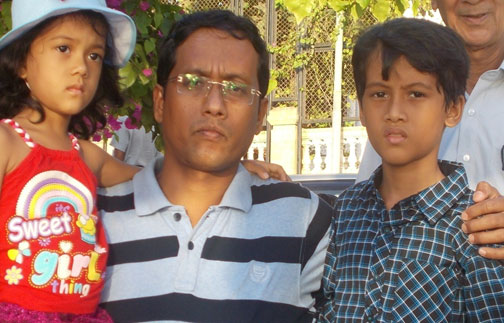
Biman Baruah, the author of this article
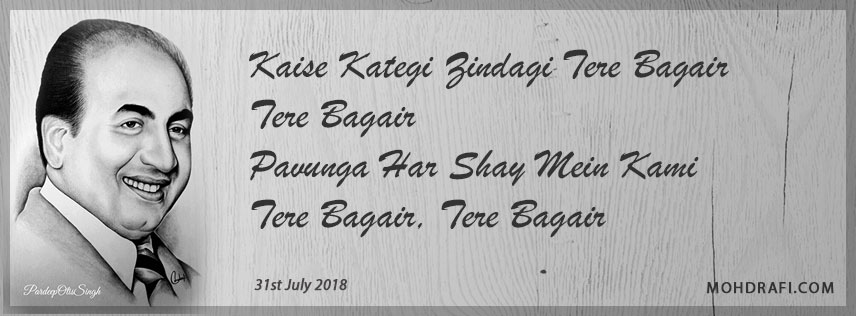














Hats off Mr. Biman Barua. I am simply overwhelmed with your writing skill. So informative but at the same time very interesting. Thanks for sharing with me. Jai jai Rafi sahab. Shat shat naman.
Biman Baruah Ji,
I wasn’t aware that Rafi Sahab has sung so many songs for Bimal Roy. There is one similarity, both legends were extra ordinary. Thanks for writing this incredible piece.
Nice well researched article but with a thin connection with our legend you tried to bring the best.
Congrats
I also would like to mention that both Anil DA & C Ramchandra changed their bias views later which was against Rafi ji .
In fact CR later regretted that he sucumbed to politics in hfm and he worked with Rafi ji in Telugu film hits of NTR ” Saleem Akbar anarkali ” in 77
Very extensively researched article on Bimal Roy..but to the best of my knowledge he was not a great Rafi admirer.
” Jalte hain jiske liye ” in Sujata was supposed to have been composed for Rafi sahab by Burmanda but apparently due to insistence of Bimal Roy it was given to Talat sahab. No doubt Talat sahab made it a masterpiece and it is one of his career best songs…but it would be better if articles are more about our beloved Rafi sahab and those who have a strong connection to Rafi sahab rather than trying to bring some contrived connection between some other personality ( who definitely is a genius in his/her field , like in this case Bimal Roy but definitely not having any great connection to Rafi sahab)
)..
Good article Bimanji,
As Bimal Roy used to make realistic films there were not much scope for song sequences.
Madhumati was an exception.
It was a musical blockbuster.
Rafisahab’s “tute hue khwabone” was a masterpiece.
Otherwise the Bimal Roy Rafisahab combination would have given more hits.
God bless you sir for writing such an informative article. I simply worship Mohd Rafi and am always looking to read as much as I can on the great man. Please can we have more articles like this. I don’t think I’ll ever tire or get fed up about reading about Mohd Rafi in the same way I’ll never tire of listening to his songs, in fact over the years I’ve learnt that no one can ever replace him and his versatality is unbeatable.
Congratulations on the article and I look forward to reading the next one!
Dear Baruah ji
Lot of thanks for sharing very pleasing and entertaining knowledge. You hv done a wonderful job and deserve our sincere thanks. Kindly keep on sharing such pleasing matters involving our beloved and all time great Mohd. Rafi Saab.
Once again my heartiest thanks and rich regards to you, Sir
r l arora
Excellent write up. Thanks for being so informative about great Bimal Roy, who passed away much before I started watching movies. Though I am also a die hard fan of Rafi Saab, have not listen to many of the songs mentioned here. Thanks for the article.
Very Informative, Baimansaab.
Great writing Mr. Biman Baruah Ji.
Congratulations!
A die hard fan of Rafi Sahab,
Dr. Khaja Aliuddin
MY CELL number is :
9833 250 701 :
BINU NAIR
Rafi Foundation Trust.
Great Flying Article Biman ji…..
deep research and interesting cinematic discovery one must say.
Pls see my comments on FB.
binu nair
Rafi Foundation Trust
Cell : 9833 259 701
Bimal Roy was a great director, arguably the finest among his peers. But I think he was not really fond of Rafi. Rafi was never the first choice of Bimal Roy – the director. Not even in the 60s. He was the guy who forced Burman Dada to use Talat for “Jalte Hain Jiske Liye”, the song which Dada originally composed for Rafi. While I love Talat and almost all his songs from the 50s, Rafi would have rendered “Jalte Hain Jiske Liye” slightly better than him and the song would have become more popular too.
In the 60s Rafi did sing in some Bimal Roy productions as a lead singer but then who could have survived the 60s without Rafi. Even the greats like CR and AB fell flat on their face due to their anti-Rafi bias. Anyway, I think “Toote hue khwabo ne” should be the best song of this association. Great melody by Salil! One of the top 50 Rafi songs for sure.